Cuttings is a dynamic new play that grew out COVID and the beating red desert heart of Mparntwe/Alice Springs. It’s about to have its South Australian premiere at the 2023 Adelaide Fringe Festival. In 2020, long-time Alice resident, novelist Jo Dutton (From Alice With Love), received a Creative Fellowship from Arts NT. She had a lot going on that year. Diagnosed with degenerative neurological condition Parkinson’s eight years earlier, she’d recently had brain surgery, travelling to and from Adelaide for treatment and recovery. Keen to discover new opportunities for her writing in lived, collaborative settings, Jo turned her hand from prose to play writing, and books to theatre. A mother of daughters, Jo had watched the rise of the #MeToo movement with…

Stories from inside life’s big top.
Posts from the “festival” Category
Berlin is no stranger to ‘cross-cultural exchange’. An historical “hub” between Eastern and Western Europe, immigrants have been steadily arriving for over 800 years. You could say the city was built on it. Something former mayor Klaus Wowereit was supremely aware of when in 2003 he proudly proclaimed the German capital “poor but sexy” to the entire world. Perhaps ‘crass’ in the eyes of some, “Wowi” was not only hoping to encourage economic immigrants (ie big business, tech start ups and the eventual “roamer workforce”) to set up shop and part with their cash in his “impoverished” city. Simultaneously he renewed and acknowledged Berlin’s longstanding historic commitment to welcoming cultural and creative migrants as well. Artists, performers, thinkers, writers, poets,…
Ninety-nine films, four per day, one month on your butt and no end in sight… Film festivals are fun. Invigorating. Inspiring. But it has to be said, they are also hazardous to your health – especially if you’re a film critic covering one of the biggest in the world. Marathon swathes of time are spent away from sunlight. You spend so much time sitting in the dark you worry about turning into a vampire and getting deep vein thrombosis. Kind of insane when you think about it… I was comprehensively reminded at the recent 2017 Berlinale, the above being the ‘statistical’ outcome from my own ’embedded’ experience there. I covered the festival for three Australian media outlets: ABC Local Radio (Overnights…
Megan Spencer, Guardian Australia, Radio National 1. Honeygiver Among The Dogs (Dechen Roder, BHUTAN) Called the first ever “Buddhist film noir”, this is a breathtaking film set in the mountains of Bhutan. A policeman is sent to investigate the disappearance of a Buddhist nun, presumed murdered. Tailing the suspect – an impossibly beautiful woman deemed a “demon-ness” by the village bigots – the film becomes an ethereal treatise about the nature of reality – and our relationship to what we ‘think’ we know. The natural and ‘sacred’ worlds crisscross at every opportunity. A profound, unpredictable, and thrilling cinematic achievement. (Panorama) 2. Those Who Make Revolution Halfway Only Dig Their Own Graves (Mathieu Denis Simon Lavoie, CANADA) An uncompromising, confronting…
Tagged: berlinale, megan spencer
Guest Post: Teresa Vena, Berliner Filmfestivals. Honeygiver Among The Dogs by Dechen Roder This is the first film completely shot in Bhutan, with all actors native from Bhutan. Female director Dechen Roder is able to show an intriguing story in beautiful pictures, with perfect rhythm. The plot is very intelligent evoking a constant menacing atmosphere, suggesting a crime that finally never happened. Centaur by Aktan Aryum Kubat The second film by this director from Kyrgyzstan tells in an authentic way about the loss of connection between ‘man’ and ‘nature’. The main character is played by the director himself; he has a great charisma. Tiere (Animals) by Greg Zglinski An intriguing roller coaster ride around the topics love, trust and jealousy.…
Tagged: berlinale, teresa vena
Guest Post: Yun-hua Chen, Goethe Institute, Mosaic Space And Mosaic Auteurs. Qiu / Inmates Audacious, sensitive, contemplative, non-judgmental, gentle and very humane, it has definitely brought new perspectives and thoughts which will stay with me for a very long time. Small Talk The most brutally candid conversation with oneself and love letter to one’s mother that I have ever seen. I truly admire the filmmaker’s remarkable courage, tenderness and strength. Tissues needed! Close-Knit It’s such a sweet and heart-warming film, and beautifully acted by the trio. Tissues needed – again! Insyriated An incredibly powerful chamber piece that shows as much the outside world in turmoil as the internal state of the distressed family, stranded somewhere in Syria. It left me…
Tagged: berlinale, yun-hua chen
Guest Post: David Mouriquand, EXBERLINER, Before The Bombs Fall. 1) I AM NOT YOUR NEGRO An unmissable offering in this year’s Panorama selection was Raoul Peck’s timely, Oscar-nominated documentary I Am Not Your Negro. The filmmaker takes the words of the late novelist and social critic James Baldwin, who wanted the lives of Malcolm X, Martin Luther King Jr and Medgar Evers “to bang up against each other”, and stylishly laces his prose with archival footage and modern clips. The result is a concise, articulate and non-hectoring chronicle of black activism during the civil rights movement, which contains eerily prophetic aspects, and comes to life through the director’s status as a cinephile. Peck uses a great number of film clips in order…
Tagged: berlinale, david Mouriquand
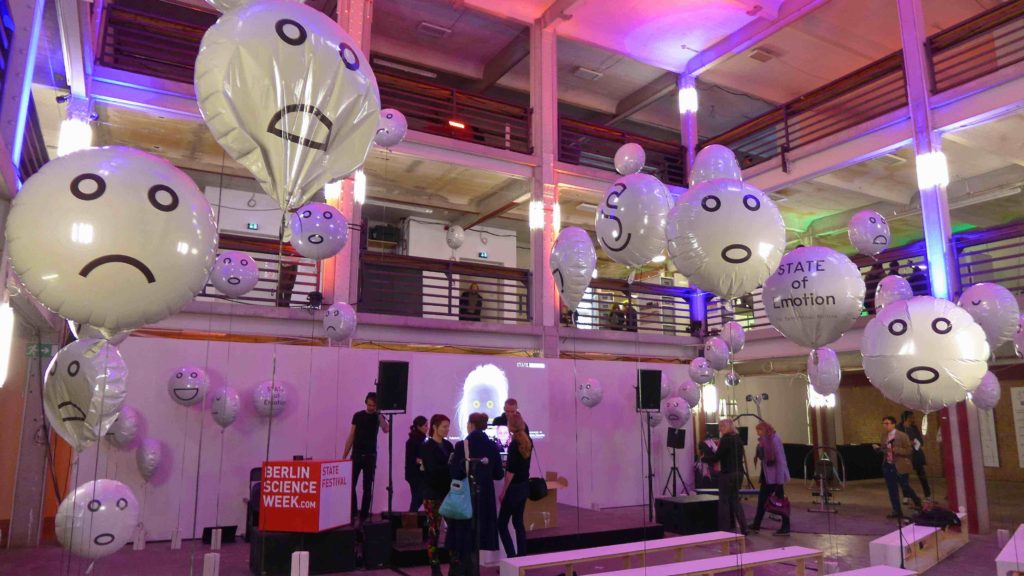
State Festival 2016, at Külhaus, Berlin. Photo: Megan Spencer (c) 2016
In November I had the good fortune to attend STATE Festival, a festival for “Open Science, Art and Society” at Kühlhaus, Berlin.
When Berlin turns on a good festival, you really feel it. I had the same range of happy emotions and visceral engagement coursing through my body at spectacular sound festivus Berlin Atonal in 2015.
Now in its second year, the theme for this year’s STATE was “Emotion: The Sentimental Machine.” Scientists, researchers, artists, makers, musicians and thinkers from Germany and beyond contributed to what was an incredibly exciting and progressive program, split into several strands: a two-day conference (where research papers were shared), public talks, interactive art installations, workshops, films, and an extensive pre-program of pop-up labs and workshops, where inter-disciplinary collaborators were brought together to work on various projects, some with seriously fascinating implications for society and culture.
The opening night “Warm Up” event manifested as A Night At The Museum, with the main room of Berlin’s famed Naturkundmuseum (“Natural History Museum”) opening to festival guests and the public.
Wandering among the interactive installations, beautifully displayed fossils and spectacularly lit dinosaurs, I half expected the prehistoric beasts to come to life in a ‘ta-daa’ moment of event-appropriate surprise. Once the jungle-esque soundscape by DJ Grizzly subsided, key note speeches began. We listened to STATE’s founder Dr. Christian Rauch, (a physicist with a PhD in nanoscience and excellent taste in electronica), the museum’s Head of Science Programme & Public Engagement Dr. Katrin Vohland and primate research scientist Dr. Katja Liebal, who gave a glimpse into her animal emotions research project with primates.
The night set the tone for what was an incredibly exuberant, optimistic and progressive few days: the festival celebrates not only science but its intersections and cross-pollination with other modalities and disciplines – namely the arts, philosophy, medicine and design. Oh – and the public.
“Affective research” was high on the agenda with a number of conference panels devoted to the neuroscience behind affect and empathy. Creative research methods were also advocated – including communicating findings via storytelling and creating “narratives” around data. Open source science and “citizen science” were also embraced, with Katrin Vohland openly declaring Naturkundmuseum’s advocacy for public involvement in scientific “deliberation” during her opening night speech. Word was out: the scientific community needs to change tack if it’s going to be relevant in – and make an impact on – today’s “post truth” society.
“Emotions seem to play an increasing role in science and science communication,” she said in her speech. “Scientists have to pack their results into stories. Some researchers already talk about the post-factual era we are entering, opening the room for populism and manipulation.”
Could science be letting go of its long-held aversion towards ‘affect’? Is “subjectivity the new black”? Listening to the STATE 2016 discourse, the answer is a resounding ‘yes’.
As we poked around the exhibits opening night, it felt like a dance party for curious people, observing, listening and discussing in unadulterated awe and wonder. It was nice to feel that way again – like delighted, curious children discovering the world for the first time.
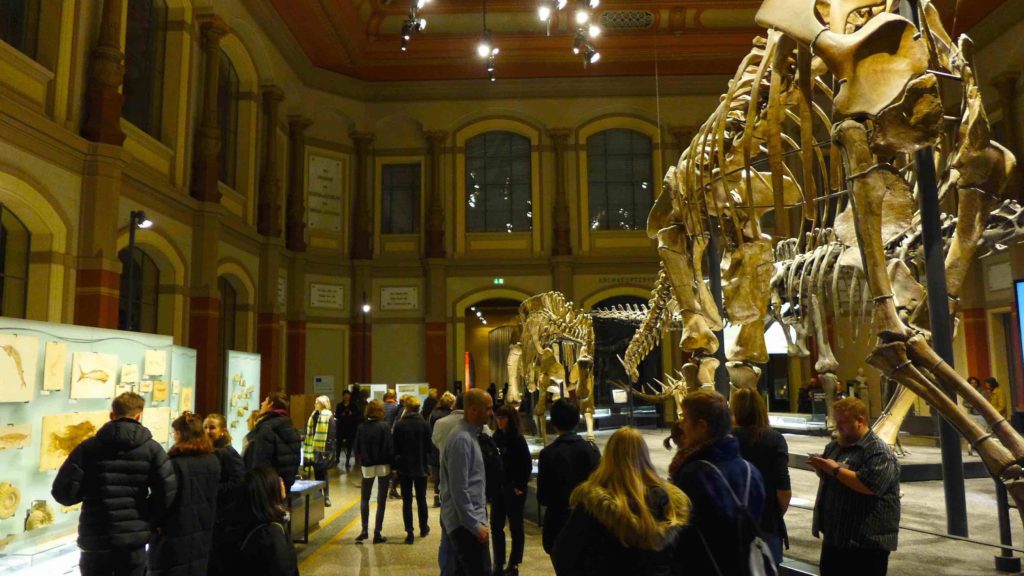
Walking with dinosaurs at STATE Festival Opening Night. Photo: Megan Spencer (c) 2016
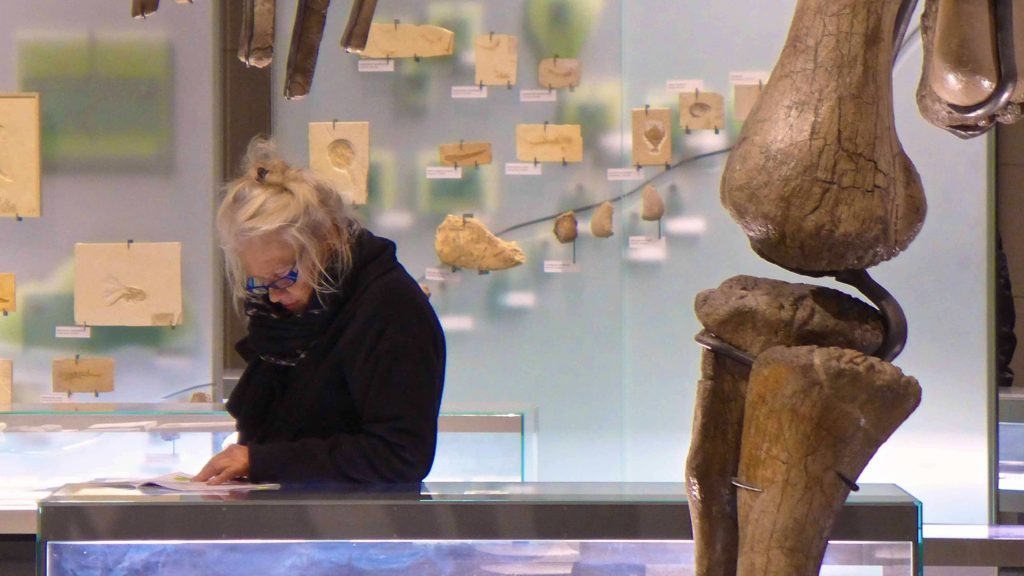
‘Dem bones’. Opening night at Naturkundmuseum, STATE Festival 2016. Photo: Megan Spencer (c) 2016
One of the projects that piqued my curiosity was ‘Digesting The Anthropocene‘, devised by American “experimental philosopher” and conceptual artist, Jonathan Keats. Namely as it made manifest the link between mind and body, and the capacity we have for intelligence using our senses (an embodied experience of knowledge, as opposed to purely a cognitive one.) It is based around his theory of “gastronification”, what he calls “an alternative tool for visualising big data”.
“Data gastronification is where we might engage the emotional cognition of people’s stomachs and intestines in getting a better understanding of “wicked” problems involving a huge number of different data sets and influencing factors, such as for example, in anthropogenic (human influenced) climate change.”
“Instead of visualizing model projections for processing by the visual cortex and brain, Keats’ method makes the data ‘fit for consumption’, literally: flow diagrams are reformulated as recipes, which can be cooked up and digested. Different scenarios and conditions will now be represented in culinary terms.” (Description from STATE catalogue.)
His local collaborators were David Marx, founder of Berlin food lab Science Kitchen; scientific researchers at Berlin’s Futuruim Project, and designer and data visualization specialist Stefan Thiel. The team worked with Keats in an attempt to make the science around climate change “digestible” for the general public, coming up with a recipe for ‘climate change sorbet’ based on three flavour profiles:
- Green = low greenhouse gas emissions.
- Blue = medium C02 emissions, and
- Turquoise = high fossil fuel emissions.
The hope being (from my interpretation of it anyway), to create a more inclusive public conversation around the problem of climate change – ie a deeper, less fraught engagement with the problem based on intuitive perception – so that taking action might become a reality rather than a political football.
To, as it were, create a solution through shared ‘gut feeling’.
It’s a very exciting idea, especially as the scientific evidence around mind/body medicine continues to grow, and the bias against ‘affect’, subjectivity and emotion within the scientific world, diminishes. Listen to my full interview with Jonathon Keats at the audio link below.
Other highlights from my STATE Festival experience:
- Listening to the research findings of Cornell University emotions researchers Dr. Adam Anderson and Dr. Eve de Rosa in their work around using feelings or “affect” as valid measures of perception;
- Dr . Helen Stark’s paper about the “History of Emotion'” and “The Man Of Feeling” in the Romantic period of literature (Queen Mary University of London);
- Receiving an immersive sound and touch massage from “sensation composer” Jacques-André Dupont and instrument designer/music composer Clément Destephen, as part of their MIM installation (“The Medium Is The Massage”). It was so beautiful I was moved to tears, and
- Seeing Werner Herzog’s documentary about the digital age, ‘Lo And Behold: Reveries of the Connected World.’ Sad, funny, frightening, and vintage Herzog.
* * *
And my festival rating? Big happy face emoji : )
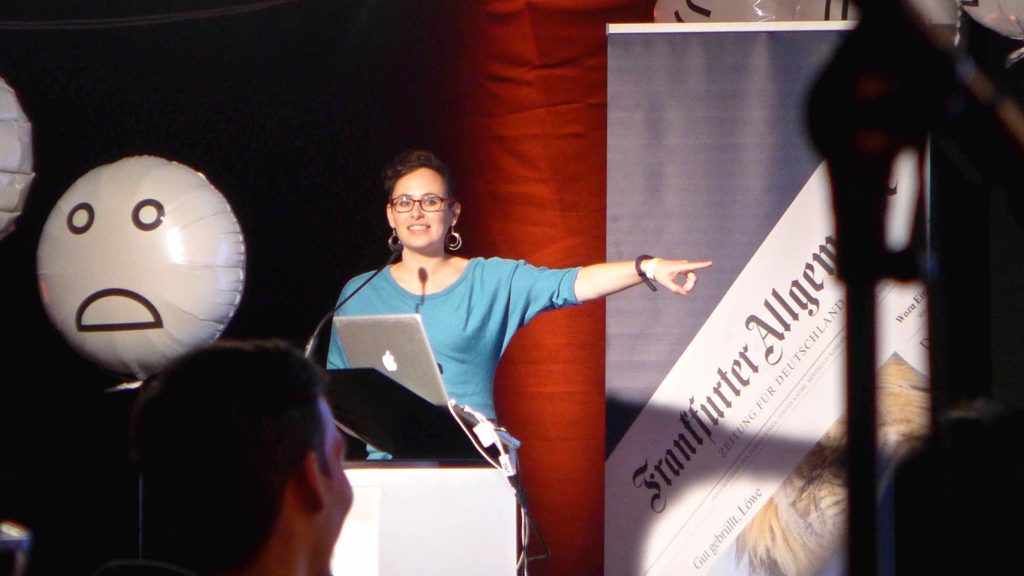
Woman of feeling: Dr. Helen Stark, delivering her paper about ‘The Man of Feeling’ in the history of Romantic Literature. Photo: Megan Spencer (c) 2016
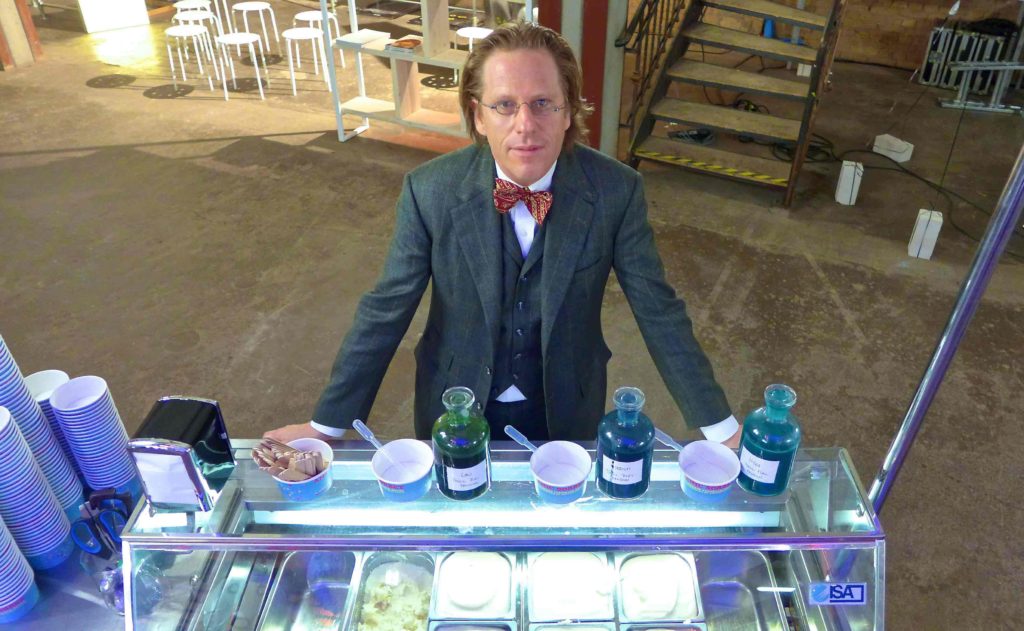
Digesting climate change: Jonathon Keats at STATE Festival, 2016. Photo: Megan Spencer (c) 2016
* * *
Words, images and sound (c) Megan Spencer 2016.
- Discover: the STATE Festival program
- View: my STATE Festival photo album
- Eat: the Climate Change Sorbet photo album
- Listen: to my STATE Festival report on Radio National
- Hear: the entire Jonathan Keats interview on Soundcloud
- Visit: STATE Festival on Facebook
Many thanks to the STATE Festival team for support, and to Jonathon Keats for the interview.